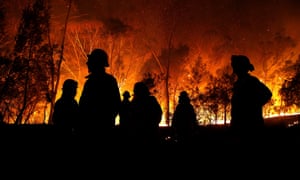Extract from The Guardian
The stories we tell about bushfire are changing. Our writers have been grappling with its link to climate crisis for years
Fifteen years ago the renowned nature writer Robert Macfarlane lamented “the deficiency of a creative response”
to climate crisis. Novels, art, music, poetry and other cultural
products were “urgently needed” so that the crisis, its causes and its
consequences could be “debated, sensed and communicated”.
In Australia ever since, even as our government repeatedly rejects the connections between human activity and increasingly catastrophic events in the natural world, artists have been heeding that call.
Bushfires have always played a significant role in telling Australian stories. But authors of recent Australian ecofiction – books that explore connections between Australia’s natural world, the human and the nonhuman – are shifting that traditional bushfire narrative, drawing connections between climate crisis and bushfire, and showing that what is occurring in Australia can no longer be considered “natural” or “normal”.
Mireille Juchau’s The World Without Us is one example, highlighting
the connections between ecological disaster and human grief through its
depiction of logging, mining and, significantly, a destructive fire in a
rural community’s past that alters the present lives of the novel’s
protagonists. In a New South Wales town surrounded by farms and
mountains, this fire threatens human infrastructure as well as the
surrounding rainforest. Towns just like this are among many that have
been devastated by bushfire in recent weeks.In Australia ever since, even as our government repeatedly rejects the connections between human activity and increasingly catastrophic events in the natural world, artists have been heeding that call.
Bushfires have always played a significant role in telling Australian stories. But authors of recent Australian ecofiction – books that explore connections between Australia’s natural world, the human and the nonhuman – are shifting that traditional bushfire narrative, drawing connections between climate crisis and bushfire, and showing that what is occurring in Australia can no longer be considered “natural” or “normal”.
And Juchau is not alone. Alice Bishop’s short story collection, A Constant Hum, tells fictional stories of the Black Saturday bushfires. Eliza Henry-Jones’s latest novel, Ache, is the story of a town and family recovering from the impacts of an intense bushfire. Alice Robinson’s Anchor Point explores the life-altering consequences of both fire and flood.
"Australian ecofiction provides readers with an alternative climate narrative to that pushed by our elected leaders"
Alexis Wright’s The Swan Book addresses the strong ties between colonisation and climate catastrophe in its depiction of a near-future Australia irreversibly affected by climate change. The text speaks of “floating ashes that flickered with fire and dazzle-danced the sky in the full-throated blizzard of heat flying over the hills”. As First Nations people mourn the loss of sacred places to fire, Wright’s work speaks volumes of what the climate crisis means for Indigenous peoples.
In the confines of his government’s misleading climate narrative, the prime minister, Scott Morrison, has waxed lyrical about the nation’s bushfire-prone past, telling Australians that “we have faced these disasters before”. His approach conforms to an outdated stereotype of the Australian wilderness as an unforgiving, nightmarish hellscape, an archaic colonial perspective that positions nature as the ultimate threat. Claire Coleman’s novel, Terra Nullius, is just one recent work that challenges this in interesting ways.
Fiction allows readers to focus not only on the human plight but on that of the nonhuman. The World Without Us, The Swan Book, Catherine McKinnon’s Storyland and Jennifer Mills’s Dyschronia are just some examples of Australian ecofiction that emphasise the lives of animals, plants, and more in the context of the climate emergency, providing a lens that does not depict nature as an all-destructive adversary.
Is it possible that we are witnessing the emergence of a genre of climate fiction: bushfire fiction?
Access to stories like these is important. Without them we will find it harder to imagine different ways of responding to the crisis, harder to understand the connections between natural processes and our own actions, and more difficult to deeply engage with the reality of the climate emergency in this country and what it means for our lives.
Reading Australian ecofiction – especially that of the bushfire kind – provides readers with an alternative climate narrative to that pushed by our elected leaders, a narrative that is more truthful, thoughtful and empathetic, and one that places the culpability for the crisis firmly at the feet of the people – yes, people – ultimately responsible.
• Rachel Fetherston is a PhD candidate in literary studies at Deakin University

No comments:
Post a Comment